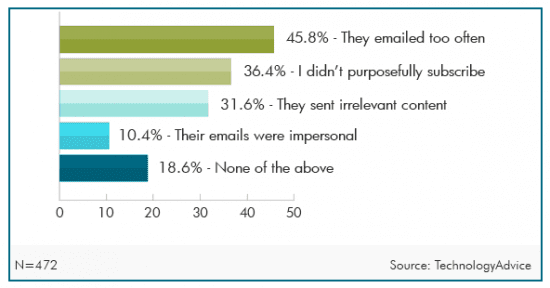Chart of the Day: Why subscribers flag email as spam
If consumers mark your email as spam, then this is clearly unwelcome since not only has your brand been tarnished in their eyes, but even worse your delivery rates to existing subscribers could be harmed. So what triggers a 'mark as spam' click? Technology Advice Research asked 472 U.S. adults, "for what reasons have you marked a business' emails as spam?"
The results show that nearly half of customers mark emails as spam because of the frequency of emails. There isn't a one rule fits all in regards to email marketing frequency because each list, segment or country is different and your frequency should match this.
Almost a third of people claimed they hadn't purposefully subscribed to receive to the emails. This does not mean that they have been necessarily "spammed", it could be as simple as 'forced subscribe', which is the implicit opt-in process of automatically having to agree to receive a subscription during a purchase or download.
One obvious answer is that it was probably easier to click, "spam" opposed to finding the unsubscribe link. If your unsubscribe link is hard to find, or the process is long winded, like having to log into an account you don't remember setting up - expect to be marked as spam. The really interesting statistic is the 18.6% of customers who chose, "none of the above", showing how difficult this is to get right.
Key takeaways:
When developing and measuring your email programme, you should consider:
- Frequency - tailor your campaigns not to the message you are trying to sell, but to your clients.
- Respect - if you have to force your clients into subscribing, your retention rate will be low.
- Simple - keep engagement simple and easy. If your clients want to unsubscribe, don't make it difficult. A unsubscribe is much better than a spam label or complaint.







